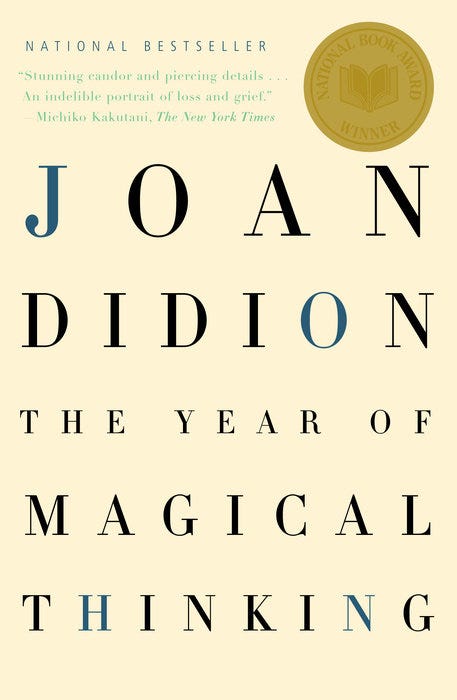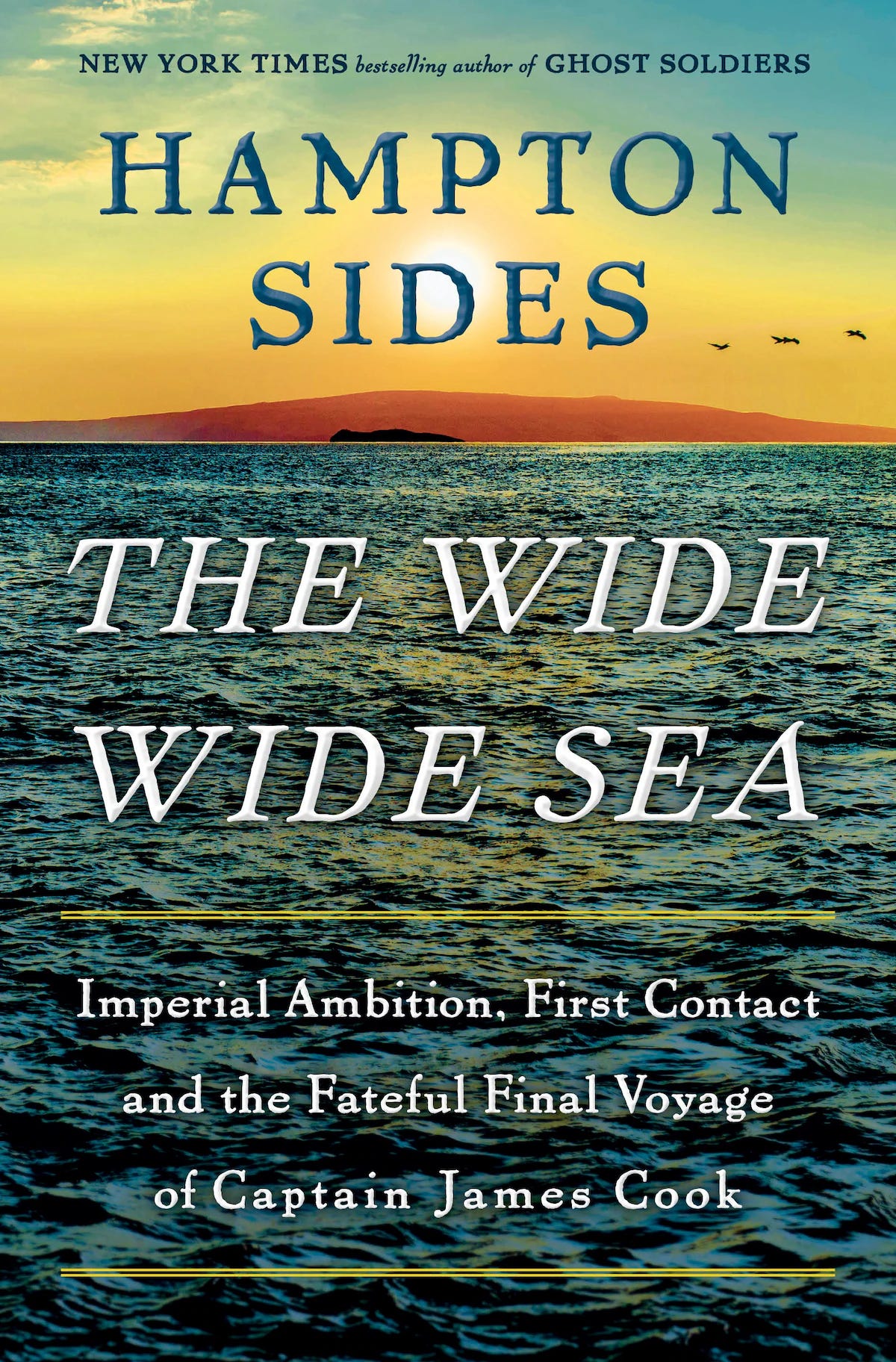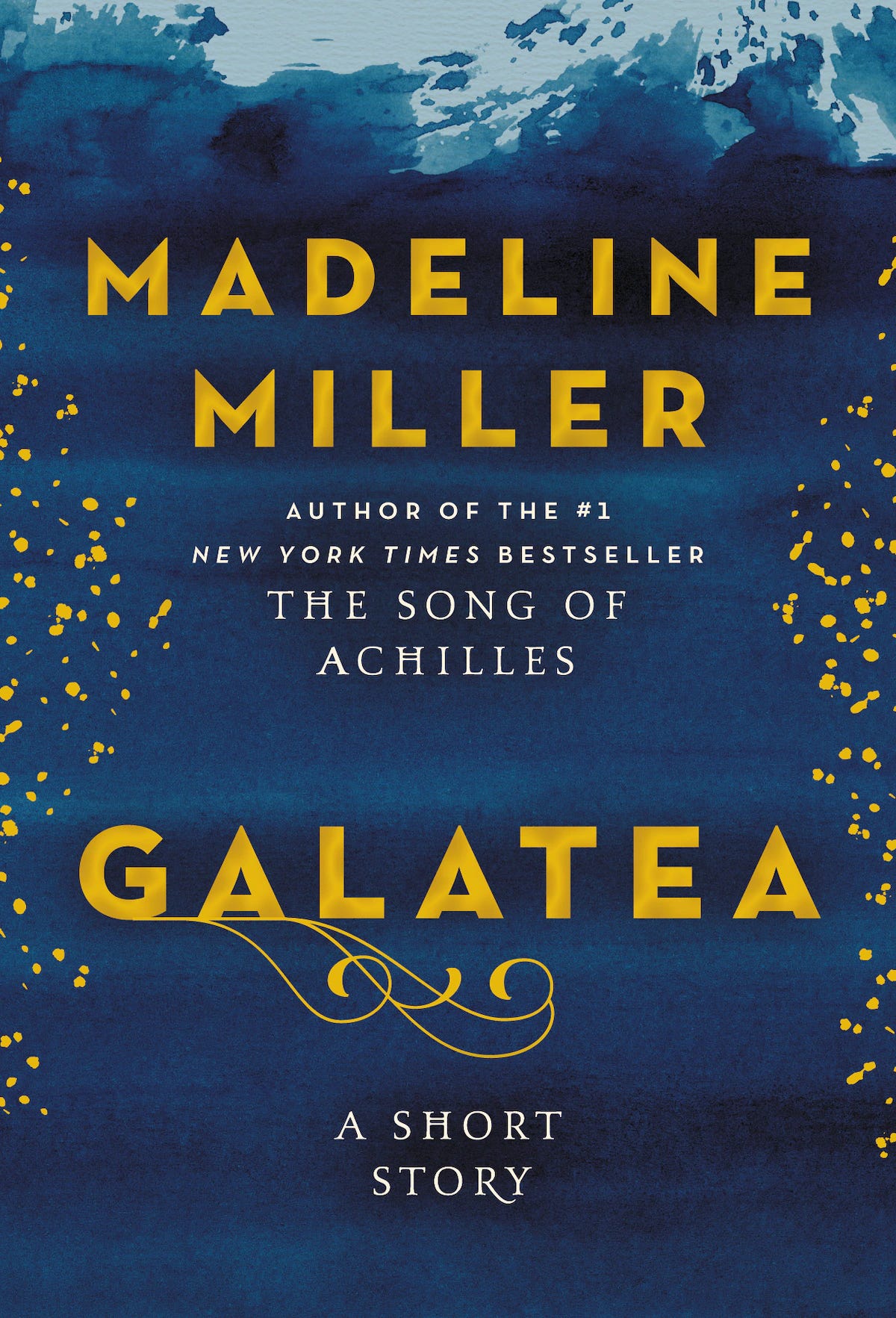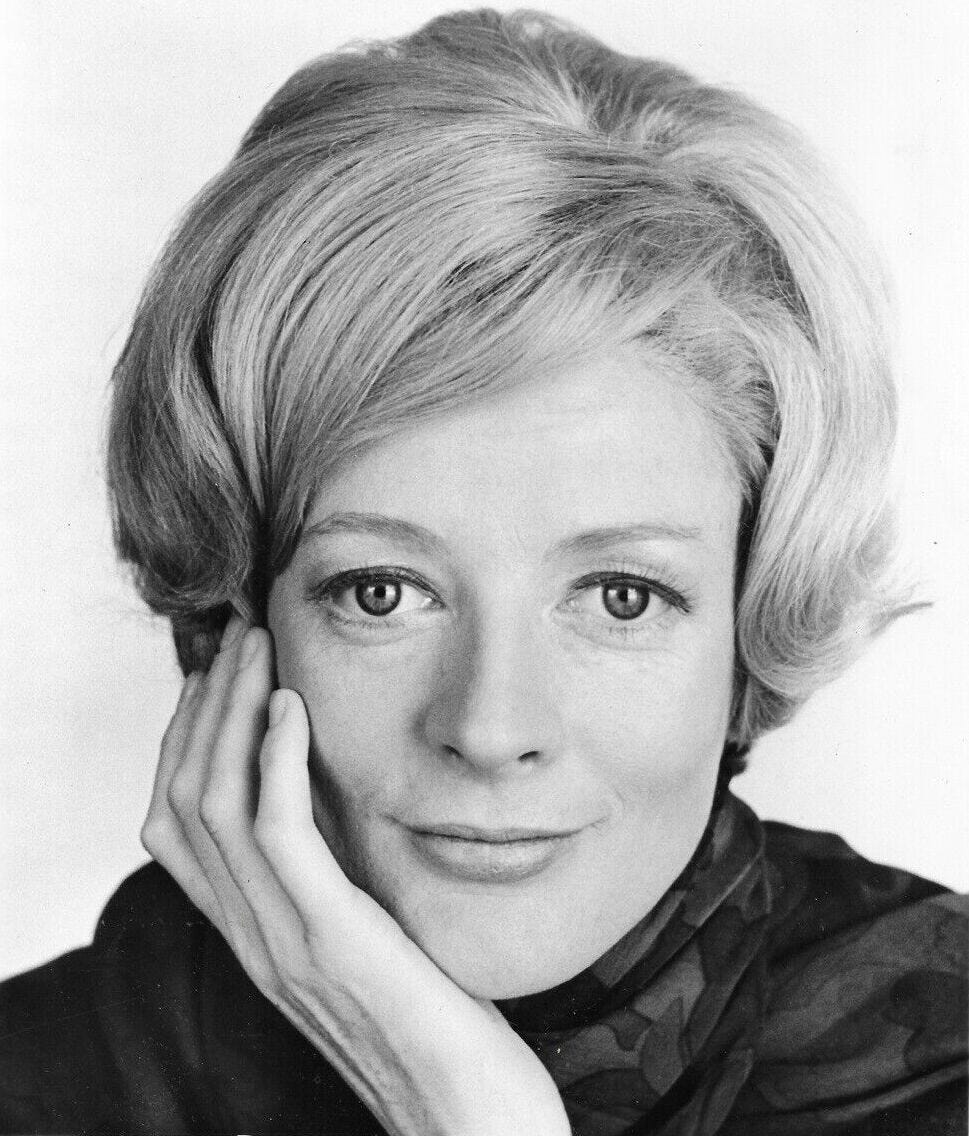I read three incredible books this past week — a Joan Didion novel that I have wanted to read for years, a nonfiction book about Cook’s 18th-century naval voyage, and a short story by Madeline Miller. Let’s get into it.
What I read:
The Year of Magical Thinking by Joan Didion
As Joan Didion explains at the beginning of her memoir, The Year of Magical Thinking is “about death, about illness, about probability and luck, about good fortune and bad, about marriage and children and memory, about grief, about the ways in which people do and do not deal with the fact that life ends, about the shallowness of sanity, about life itself.”
In December 2003, two awful things happened. Just a few days before Christmas, Joan Didion and her husband, John Gregory Dunne, saw their only daughter, Quintana, go into septic shock from a flu infection that had transformed into pneumonia. Doctors placed Quintana in a medically induced coma. Then, on the evening of December 30, Didion’s husband “slumped motionless” in his chair while she was mixing a salad for dinner. Dunne was rushed to the hospital, where he was pronounced dead. “You sit down to dinner and life as you know it ends,” Didion writes. These tragedies took over Didion’s life, and this memoir is her attempt to make sense of that year.
This book is an intensely personal, raw portrayal of loss and mourning. Didion observes that grief is often hidden, particularly because it “now occurs largely offstage.” Dunne died but was ever-present to her:
Grief turns out to be a place none of us know until we reach it. We anticipate (we know) that someone close to us could die, but we do not look beyond the few days or weeks that immediately follow such an imagined death. We misconstrue the nature of even those few days or weeks. We might expect if the death is sudden to feel shock. We do not expect this shock to be obliterative, dislocating to both body and mind. We might expect that we will be prostrate, inconsolable, crazy with loss. We do not expect to be literally crazy, cool customers who believe that their husband is about to return and need his shoes. . . . Nor can we know ahead of the fact (and here lies the heart of the difference between grief as we imagine it and grief as it is) the unending absence that follows, the void, the very opposite of meaning, the relentless succession of moments during which we will confront the experience of meaninglessness itself.
The Year of Magical Thinking is also a portrait of a marriage. Dunne and Didion’s four-decade marriage was complex but strong. In one instance, she recalls a part of a fight with John: “Why do you always have to be right? I remembered John saying . . . . He never understood that in my own mind, I was never right.”
While “you can love more than one person,” she maintains that marriage is something else entirely — it represents a lifetime of companionship:
Marriage is memory, marriage is time. “She didn’t know the songs,” I recall being told that a friend of a friend had said after an attempt to repeat the experience. Marriage is not only time: it is also, paradoxically, the denial of time. For forty years I saw myself through John’s eyes. I did not age. This year for the first time since I was twenty-nine I saw myself through the eyes of others.
I am admittedly late to reading this memoir; it was published in 2005 to wide critical acclaim. I picked it up because some of the most moving memoirs I have read are about coping with the loss of a loved one (like Crying in H Mart, Wild, Stay True, and Grief Is for People), and Didion’s work is one of the pillars of this genre. The Year of Magical Thinking definitely merits this critical acclaim. It is an incredibly well-written, searing portrait of loss and life. I highly recommend it if you are interested in this type of memoir.
Rating: 4.5/5
Genre: Nonfiction - Memoir (Grief)
Notable prizes/book clubs/lists: National Book Award for Nonfiction (2005); Pulitzer Prize Finalist
Page count: 227 pages
Audio: 5 hours and 5 minutes
The Wide, Wide Sea: Imperial Ambition, First Contact and the Fateful Final Voyage of Captain James Cook by Hampton Sides
The Wide Wide Sea is a gripping account of Captain James Cook’s sprawling third and final voyage in search of the elusive Northwest Passage from 1776 to 1779. Cook’s expedition left from England traveled to present-day South Africa, South America, Australia, New Zealand, Polynesia, Hawaii, north to Alaska and beyond, and back to Hawaii.
Cook’s first two voyages were largely scientific. They made Cook, who had “risen from virtually nothing,” a celebrity in England. The objectives of the first two voyages were, respectively, to observe the transit of Venus from the Pacific to determine the distance between the Earth and the Sun and to ascertain whether there was another continent in the middle of the Pacific. Cook was a talented cartographer, and his crew knew him as a restrained, orderly captain. Interestingly, given the ubiquity of Cook’s name, he never named landmarks after himself. He chose native names whenever he learned of them.
His third voyage marked a departure from these initial expeditions. While Cook was a relatively measured captain during his first two expeditions, he acted erratically and often cruelly on this third voyage. When a local stole a goat from him, he sent his sailors on a multiday rampage to torch local villages. In another instance, his response to a petty theft was to cut the ears off of villagers. As Sides writes, his crew worried that Cook’s “judgment — and his legendary equanimity — had begun to falter.” Some historians think Cook suffered from some physical ailment or disease on this voyage.
The search for a Northwest Passage was also inextricably tied up with colonialism. Cook claimed land for England whenever he could. King George III also sent Cook with a large collection of plants, domesticated livestock, and birds to replicate the English countryside in remote lands.
Among the crew was a man named Mai from Raiatea (present-day Tahiti). When he was a boy, warriors from Bora Bora invaded Raiatea, murdered his father, and enslaved much of the population. Years later, Mai witnessed the English navy’s firepower and concluded that English artillery and weapons were the way to defend and avenge his people. When Cook’s ships sailed through seven years later, Mai persuaded them to take him to London. He spent several years in England, where he was a fixture in London society. On Cook’s third voyage, Mai planned to return with artillery to his homeland.
This book is fascinating and, at times, disturbing. I read The Wide Wide Sea because I have seen Cook’s name and controversial legacy throughout the Pacific and wanted to learn more about his expeditions. When my husband and I lived in Alaska, I worked just a few blocks from the Hotel Captain Cook, which is covered with art and murals depicting Cook’s voyages.
Sides brings Cook’s hair-raising expedition to life in this book. The men face daunting ocean storms, thick fog, and frigid temperatures. But The Wide Wide Sea is not just an adventure tale — Sides also grapples with the legacy of colonialism. Cook was a controversial figure. “Eurocentrism, patriarchy, entitlement, toxic masculinity,” and “cultural appropriation,” Sides writes, are just a few of the issues surrounding Cook’s legacy. Sides takes a measured approach to this charged subject.
My criticisms of the book are relatively minor. At times, the narratives felt meandering. (I am likely spoiled by the tight storyline in Alfred Lansing’s Endurance, which I read a few weeks ago.) These digressions were probably unavoidable, given the length and breadth of Cook’s journey. Many of the stops could be the subjects of entire books. It also starts out a bit slow; Sides devotes considerable time to the expedition preparations at the beginning of the book. I think he did this partly because of the wealth of information available on Mai’s time in England, but I was anxious for the voyage to start. The last two parts of the book were the most interesting to me — when Cook explores Alaska and then returns to Hawaii.
Minor critiques aside, I highly recommend The Wide Wide Sea. It is engaging, informative, and thought-provoking. (If you do not have time to read it but are interested in Cook, check out this book review and summary from The New Yorker.)
Rating: 4.3/5
Genre: Historical Nonfiction (Narrative)
Notable prizes/book clubs/lists: Obama’s 2024 summer reading list
Page count: 408 pages
Audio: 15 hours and 41 minutes (British narrator)
Galatea by Madeline Miller
Galatea is a short story by Madeline Miller (author of Circe and The Song of Achilles). Miller reimagines Ovid’s Pygmalion from Metamorphoses as the prototype of the incel.
In the original Metamorphoses, Pygmalion witnesses the Propoetides women prostituting themselves (Aphrodite later punishes the Propoetides by turning them into stone). Their actions repulse Pygmalion, and he decides to remain celibate. He focuses on sculpting and decides to carve his ideal woman from ivory. The sculpture is so lifelike that he falls in love with it and begs Aphrodite to bring the figure to life. Aphrodite acquiesces, and the woman/statue eventually bears Pygmalion a daughter called Paphos (the city in Cyprus is named after her). While the woman remains unnamed in Metamorphoses, later authors called her Galatea.
In Miller’s version, Galatea wakes in a medical facility. It is implied that she was institutionalized after trying to escape her husband — Pygmalion is unnamed in Miller’s version. Galatea narrates the story in a lyrical and somber voice as she discusses her husband’s abuses and her love for her daughter.
The Pygmalion myth has long been the source of inspiration for writers, including Shakespeare’s The Winter’s Tale (in which the statue of Queen Hermione comes to life), Carlo Collodi’s The Adventures of Pinocchio, George Bernard Shaw’s 1913 play Pygmalion, My Fair Lady, and Pretty Woman. Miller discusses the meaning and legacy of the original myth in the afterword to Galatea — Is it a love story? A metaphor for how artists fall in love with their art? Miller sees it through a feminist lens and argues that the ending of Pygmalion is “only happy if you accept a number of repulsive ideas”:
that the only good woman is one who has no self beyond pleasing a man, the fetishization of female sexual purity, the connection of the “snowy” ivory with perfection, the elevation of male fantasy over female reality. Galatea does not speak at all in Ovid’s version. Even more tellingly, she is not given a name — that was one of the few details I took from other sources. She is only called ‘the woman.’ She is meant to be a compliant object of desire and nothing more.
I really enjoyed Miller’s feminist take on this tale; it reminded me of her 2018 novel, Circe. This story is short but definitely worth a read if you like retellings or Miller’s other works.
Rating: 4.5/5
Genre: Fiction - Retellings
Page count: 60 pages
Audio: 46 minutes (British narrator).
Articles and podcasts I cannot stop thinking about:
“The Exhilarating Brilliance of Maggie Smith” from The New Yorker
Success came early for Maggie Smith, and she continued to have a long career in theater, on television shows, in movies, and (most recently) on TikTok. This New Yorker article discusses her career. It also mentions this clip from “Tea with Dames,” which went viral in recent years: “We’re going to work forever if we’re asked,” Dame Judi Dench says. “But you’re always asked first, if I may say so,” Dame Maggie Smith replies. “Don’t turn on me!” Dench says. “I’m turning on you. It’s all coming out now,” Smith quips.
Nobody Wants This vs. Fleabag
I started watching Netflix’s Nobody Wants This, a romantic comedy about a podcast host (Kristen Bell) who dates a hot rabbi (Adam Brody). It made me think about Andrew Scott’s hot priest character in Fleabag. So I rewatched Phoebe Waller-Bridge’s Saturday Night Live monologue. She explains why everyone is so obsessed with this type of character:
I call the character “Priest” in the script, but everyone started calling him “Hot Priest.” Obviously Andrew is hot, but this “Priest” character caused such a horn-storm. Andrew and I were trying to figure out what it was about him that was driving women so mental. And we boiled it down and realized, it was because he was doing this one thing: listening. Really, really listening. Try it, guys.
Celebrity Book Club’s J.D. Vance episode
Celebrity Book Club is one of my favorite podcasts. The hosts, Steven and Lily, discuss a celebrity memoir each week — the selection ranges from Ulysses S. Grant’s personal memoirs to Lauren Conrad’s 2010 Style. This week’s episode was about J.D. Vance’s Hillbilly Elegy. They describe Vance’s general thesis as “I’ll do whatever I can to become the coastal elites I resent while I can still claim to be a hillbilly.” But they also note that “when you go on Appalachia Reddit, they don’t claim him.”
What I am cooking:
V good salmon
I made this Ina Garten salmon recipe, our go-to salmon marinade (olive oil, dijon, soy sauce, and garlic).
This salad dressing is perfect for leftover (or fresh!) salmon — I now make extra salmon so I can make this the next day.
A dinner party feast
Homemade hummus and herbed tehina sauce
Diced cucumber and tomato salad












